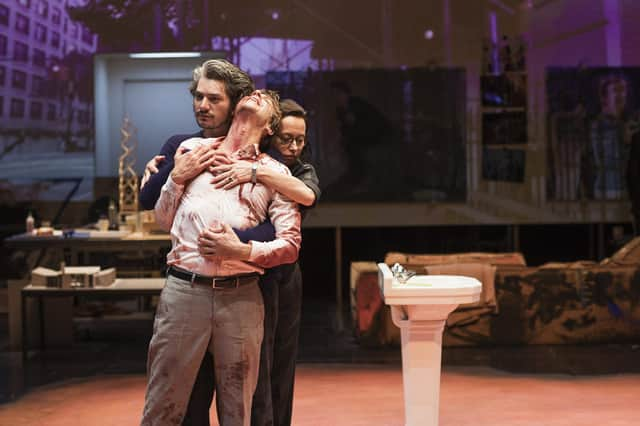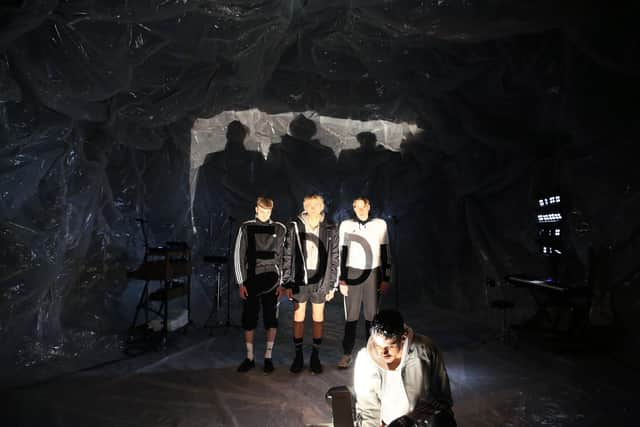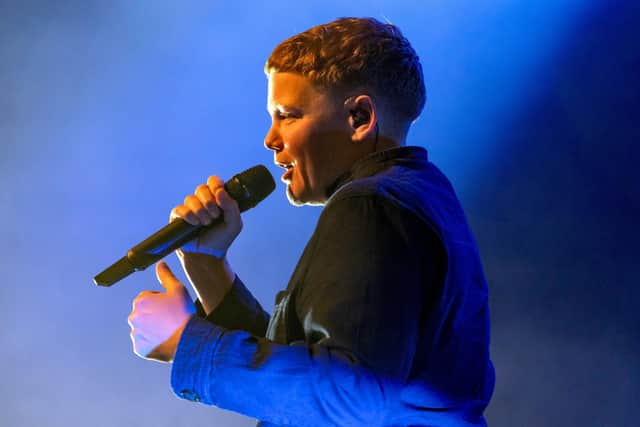Edinburgh International Festival reviews: Czech Philharmonic 1 | The End of Eddy | Kae Tempest | Arab Strap | Australian World Orchestra | A Little Life | Hebrides Ensemble


It was a joyful, muscular, big-boned start to the two concert EIF residency from the Czech Philharmonic and its chief conductor Semyon Bychkov. And it would be hard to imagine a more authentic one, either, than its all-Czech programme.
Ironically, though, it was Edinburgh’s own Festival Chorus that really impressed in the tumultuous, euphoric Janáček Glagolitic Mass with which Bychkov ended the programme: the EFC singers were on blisteringly good form, with impeccable ensemble and all the boldness and richness – not to mention sheer volume – that the piece needs. The Czech orchestral players had all of that too, in an account that showed up all the uncompromising cragginess of Janáček’s writing, with a wonderfully turbulent but lyrical organ solo from Daniela Valtová Kosinová.
Beforehand, French pianist sisters Katia and Marielle Labèque had delivered similar energy and focus in Martinů’s Concerto for Two Pianos, and remarkable stamina, too, in the piece’s unstoppable, machine-like, finger-breaking figurations – which continued, albeit in a very different style, in their substantial encore, the final of Philip Glass’s Four Movements for Two Pianos.


The Czech musicians could probably have played Bychkov’s opener, Dvořák’s Carnival Overture, in their sleep, but he goaded them into a jubilant, dazzling account all the same. An unforgettable, spirit-raising evening.
DAVID KETTLE
THEATRE
The End Of Eddy *****


Church Hill Theatre
On a darkened stage, four young men in the tracksuit-and-hoodie uniform of western working-class teenagers pull on guy ropes to raise a tent of heavy, crushed-looking plastic material. It creates a space for them, but a limited one; and it looms and droops around them in increasingly oppressive style as the story unfolds, perfectly embodying the crushing social atmosphere of the depressed industrial small-town in northern France where our hero Eddy grows up, bullied and beaten day after day for being gay.
Since its publication in 2014, Edouard Louis’s novel The End Of Eddy has become a classic among gay coming-of-age stories, and director Eline Arbo’s small-scale version of the story – co-adapted with Thomas Lamers, and presented in Edinburgh by Internationaal Theater Amsterdam – is a tightly-choreographed and thrilling piece of gig theatre, driven by a beautifully performed score of songs by Thijs van Vuure.
Four young men play Eddy, his family, and the gang of boys, passing the role of Eddy from one to another in a style that movingly captures the potential vulnerability and “femininity” in every teenage boy, as well as the potential for aggression and violence. Victor Ijdens and Jesse Mensah turn in memorable performances as Eddy’s parents, complex characters who combine love for Eddy with disgust at his sexuality, and a preoccupation with the physical toughness, pain and disappointment of their own working-class lives.
This is a mighty, beautiful and hopeful piece of ensemble theatre, delivered with an unforgettable sensual boldness and skill by a cast which also features Felix Schellekens and Romijn Scholten; and Edinburgh audiences rose as one to cheer them to the echo at the weekend.
Joyce McMillan
MUSIC
Kae Tempest ****
Leith Theatre
There are days when a performer plays a good show, and there are gigs like Kae Tempest’s the other night. They spoke at the beginning, trying to put into words what felt so good about the atmosphere. “I feel back at zero again,” they said, suggesting a sense of recharged energy. “There’s something about being back in this city…”
The first section of the set was Tempest’s recent fifth album, The Line Is A Curve, in its entirety, their melodically spoken lyrics lent textured electronic backing by synth player Hinako Omori. It’s a stark, nocturnal sound, cycling through the ghostly house of I Saw Light, the grime edge of Nothing To Prove, the trip-hop-timed Don’t You Ever and the defiant EDM of Move.
These Are The Days and Grace from the album sat poignantly alongside the selection of Tempest’s highlights later in the set, including the bittersweet affirmations of Hold Your Own and People’s Faces, and the ever-powerful Europe Is Lost.
At the end, Tempest focused their thoughts to explain how their Edinburgh appearance earlier this year had come at a difficult time when they were coming to terms with this album’s lyrical exploration of their gender identity and surrounding depressive thoughts. Now, their return was joyful and triumphant.
DAVID POLLOCK
MUSIC
Arab Strap ****
Leith Theatre
“My children are here,” noted Aidan Moffat towards the end of this latest triumphant phase of Falkirk-by-way-of-Glasgow indie troubadours Arab Strap’s return to life following last year’s first record in 16 years, As Days Get Dark. “I’m very glad we don’t have a swear box at home, I’d be f***ed. Plug your ears, kids.”
The next song in the encore was Packs Of Three, a classic of the still-edgy duo’s diarist’s blend of misanthropy and dark humour, in which its female subject infamously – and graphically – recalls the largest penis she ever encountered. Its presence is still a fan-favourite moment, but Moffat and Malcolm Middleton are older now, both parents, and Moffat’s lyrics of youthful misadventures with sex, relationships and alcohol these days feel like personal period pieces.
“She was the best shag I’d ever had,” he sang on Packs Of Three, adding a sly “at the time” to mark the passing years. Where songs like this, New Birds and the catastrophic hangover memoir I Would’ve Liked Me A Lot Last Night mark messy life landmarks, The First Big Weekend has become an upbeat, celebratory anthem in line with their new and most successful record’s chiming sonic maturity, a pounding burst of the clubbing old times from a band which has rediscovered its future.
DAVID POLLOCK
MUSIC
Australian World Orchestra with Siobhan Stagg ***
Usher Hall
What a difference a day makes. On Thursday, the LSO showed off its sonic finesse honed over decades. Friday, however, was a different story, with the Australian World Orchestra, founded in 2010 and drawn from Australian players whose day jobs are in other global ensembles. Sadly, it showed: there wasn’t much agreement on sound or identity within sections, let alone across the orchestra, with the result that there were ragged moments and disagreements over tuning.
That said, the musicians played with enormous spirit, urged onwards by the star of the evening, conducting éminence grise Zubin Mehta, 86, and a restrained but urgent presence in a demanding programme. His opening Webern Passacaglia matched vivid detail with a sure command of the music’s architecture, and he piloted an expert course through the same composer’s more uncompromising Six Pieces For Orchestra, its ear-shattering funeral march a stand-out moment.
There were some rough edges to Mehta’s Dvořák Seventh Symphony, and Australian soprano Siobhan Stagg struggled at times to be heard above the rich orchestration of Debussy’s Ariettes oubliées by her compatriot Brett Dean, who was sitting in the front desk of the violas. A memorable evening, but perhaps more for what it represented than for what it achieved.
David Kettle
THEATRE
A Little Life ****
Edinburgh Festival Theatre
Over the last 24 years, director Ivo van Hove of Internationaal Theater Amsterdam has built a relationship with Edinburgh Festival audiences that allows him to lead us into profoundly challenging places; and so it is with his brave and exquisite four-hour staging of Hanya Yanagihara’s award-winning 2015 novel A Little Life, the tale of a man called Jude – brilliant, beautiful, and much loved, who has nonetheless been so deeply damaged by a nightmarishly abusive childhood that, for him, there can finally be no happy ending.
Set on an orange square of carpet in a series of upmarket New York homes, Jude’s story unfolds both in a present day which runs from his twenties to his late forties, and through flashbacks, memories, and a final full account of what he suffered as a child and teenager. These shifts in perspective are evoked through simple changes of body language, costume and lighting that take us in an instant from Jude’s spacious New York apartment to the many dark places where he was monstrously abused.
The result is an adulthood surrounded by love and healing opportunities – three dear friends, a wonderful counsellor called Ana, and a college professor who adopts him as his own son – which nonetheless cannot break Jude’s ingrained patterns of self-disgust, self-harm, and inability to enjoy sexual intimacy.
Among a superb cast of eight, brilliantly supported by an eight-piece all-female string ensemble, Ramsay Nasr’s performance as Jude stands out as an unforgettable tour de force. He receives impeccable support from Maarten Heijmans as Jude's partner Willem, and the magnificent company; in a story so full of pain and loss as to be almost unbearable, and yet told with such a loving and tender attention to every detail of a human life that not a soul in the audience can fail to identify with it, and to be utterly moved, absorbed, and uplifted, from start to finish.
Joyce McMillan
MUSIC
Hebrides Ensemble with Brett Dean ****
Queen’s Hall
Humour and playfulness ran through this eclectic programme presented by the Hebrides Ensemble with Australian composer and violist Brett Dean.
Dean’s arrangement of Richard Struass’s Till Eulenspiegels Lustige Streiche for string quintet and wind quartet brilliantly captured the ebullience of the titular Till’s merry pranks in this spirited performance. There were hijinks galore, especially when the censorious strings faced off against the mischievous woodwind during the teasingly protracted ending.
Written in 1961, Dean’s Recollections for eight players captures memories from everyday life in six short vignettes. In the atmospheric Dead Of Night, accordion-like chords interrupted plucked strings which sounded like raindrops, while short, crushed notes on the piano and percussion created nocturnal mayhem in Don’t Wake Mother. There was a poignancy to Locket with the sighing glissandi phrases suggesting the frustrating elusiveness of the past.
The Hebrides Ensemble, joined by Dean on viola, explored the rich emotional spectrum of Brahms’s String Sextet No 1 in B flat Major in this immaculate and finely nuanced reading. There was plenty of lyrical warmth in the opening allegro, a hymn-like quality to the andante and wistful melodies in the finale, but it was the witty scherzo that had the musicians beaming throughout.
Susan Nickalls